From your mood to your heart and your gut
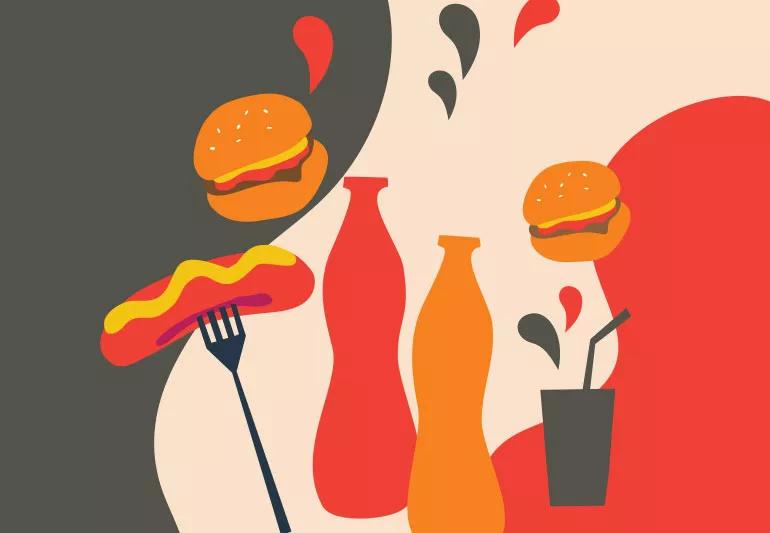
When 5 p.m. rolls around and you haven’t given a single thought to what’s for dinner, the glowing sign in front of the burger joint down the street might be calling your name.
Advertisement
Cleveland Clinic is a non-profit academic medical center. Advertising on our site helps support our mission. We do not endorse non-Cleveland Clinic products or services. Policy
A quick swing through the drive-thru can seem like a great option, but there’s a definite downside. In order to serve up food so quickly, cheaply and consistently, many fast food restaurants focus on process and efficiency instead of on serving quality, nutritious foods.
An occasional fast food meal isn’t anything to fret about, says dietitian Nancy Geib, RD, LDN. Sometimes, it might be your only option.
“If you do your research and you look for the best options, you can definitely still go to a fast food restaurant if that’s all you have,” she says.
But if burgers, French fries and greasy breakfast sandwiches become centerpieces of your diet, they could take a serious toll on your health. Unhealthy diets increase your chances of developing depression, cancer, type 2 diabetes, heart disease and other chronic conditions.
The history of fast food dates back almost a century, but the concept — and some of America’s most well-known fast food eateries — really took off during the 1940s and 50s. Today, it’s become such a staple of culture that as many as one in three Americans eat fast food every day.
You know fast food when you see it: It’s highly processed, mass-produced food that’s prepared quickly — usually on a grill, in a fryer or in a microwave. Fast food restaurants follow very specific preparation methods to make sure you get the crispy, greasy fries you expect every time.
Advertisement
Different foods can affect everyone in different ways, but here are just some of the things that frequently eating fast food might do to your body:
Many fast food items are packed with sodium, which acts as a preservative and enhances taste. “Everything that’s processed, packaged or boxed is going to have sodium,” Geib says.
The problem is, high-sodium diets are known to increase blood pressure, which puts stress on your cardiovascular system. Over time, high blood pressure can stiffen or narrow your blood vessels, becoming a major risk factor for heart attack, stroke and heart failure.
Ideally, most adults should try to keep their salt intake under 1,500 milligrams per day, according to the American Heart Association — though its current recommendations allow for up to 2,300 milligrams daily. Because sodium is so prevalent in our diets, it can add up quickly.
For example, one bacon cheeseburger alone can get you pretty close to the daily recommended 1,500 milligrams of sodium. So can a large piece of fried chicken breast with mashed potatoes and gravy. Even seemingly healthier options, like an Italian-style sub sandwich, can contribute more than 1,000 milligrams to your daily intake.
Eating meals that are high in sodium, high in fat or heavy with refined carbohydrates (such as bread, buns or breading) can all leave you feeling bloated. And, if you add a soda to your meal, the carbonation could make it worse. Bloating should only be temporary, but it could cramp your style if you’re wearing pants that are tighter in the waist or if you’re trying to get rings on or off your fingers.
Food that’s fried in oil is high in fat — and that includes saturated fat. Eating too much saturated fat can drive up your LDL, or “bad,” cholesterol, which puts you at risk for heart disease. The American Heart Association recommends that no more than 6% of your daily calories come from saturated fat. If you eat 2,000 calories a day, that’s about 13 grams, or the amount that’s in one bacon, egg and cheese breakfast sandwich.
Bagels, muffins and anything breaded might be delicious, but they’re all processed carbohydrates that lack fiber. Eating adequate amounts of fiber (25 to 35 grams a day) helps keep things moving in your digestive tract. It lowers your risk for diverticulitis and other conditions associated with straining or constipation, such as hemorrhoids and hernias.
Dietary fiber also helps your good gut bacteria flourish and keeps you feeling full. If you rely heavily on fast food, you’ll struggle to get the recommended amount. For example, a coffee-shop blueberry muffin will give you nearly 20% of your daily carbohydrate needs but only a gram or two of fiber.
Advertisement
If you go to the drive-thru and grab a value meal for dinner, chances are you’ll end up eating a bigger portion (and higher-calorie foods) than you would if you were cooking at home. If that becomes a regular thing, all those extra calories can add up to extra pounds. And when those calories are mostly from highly process carbohydrates, you might end up feeling hungry again within a few hours, which can lead to — you guessed it — even more extra calories.
Then there’s the sugar factor. Sugar is a major culprit in the obesity epidemic. It hides in a lot of foods, including drinks and sauces. Guess how much sugar is in your morning café mocha? Upwards of 25 grams. Or in that vanilla milkshake? More than 80 grams, if you make it a large. That’s nearly 20 teaspoons!
A quick hit of refined carbohydrates and sugar causes a spike in your blood sugar, which prompts your body to produce a surge of insulin to quickly bring it down. This spike-and-crash cycle can leave you feeling tired and cranky.
Meanwhile, a balanced meal with protein, healthy fats and fiber-rich carbohydrates takes longer for your body to digest and absorb. This slows the release of sugar into your bloodstream, so you get sustained energy without a crash.
Advertisement
When you eat a diet that’s high in saturated fat, sodium, sugar and refined carbs, you’re not only getting too much of those things, but you’re also missing out on a lot of other important nutrients. Fruits and vegetables — beyond the iceberg lettuce and tomato slices that come on fast food sandwiches — are rich with vitamins, minerals and antioxidants that nourish your body and improve your mood.
Eating a lot of processed foods may even increase your risk for depression.
Advertisement
It actually is possible to eat fast food without sabotaging your healthy diet, but it requires a little legwork.
Look for meals with lean proteins, veggies and fiber, and avoid anything supersized.
“You can make an informed choice by doing research to find out the nutritional content of a particular fast food item,” Geib says. “All of the major restaurants should have that information online or be able to hand it to you in the restaurant, if you ask.”

Sign up for our Health Essentials emails for expert guidance on nutrition, fitness, sleep, skin care and more.
Learn more about our editorial process.
Advertisement

They’re full of calories and sometimes trans fats, which contribute to stomach issues, inflammation and a higher risk of having obesity and heart disease

This synthetic food dye must be removed from all foods by 2027 and from all medications by 2028 for health concerns

Stress, lack of sleep and not eating enough all contribute to sugar hankerings
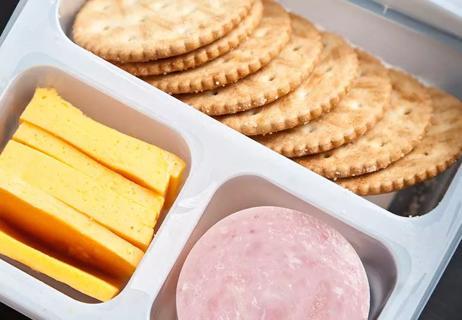
They’ve been altered to include fats, starches, sugars and hydrogenated oils

WARNING: Bacteria could be present due to raw flour and eggs
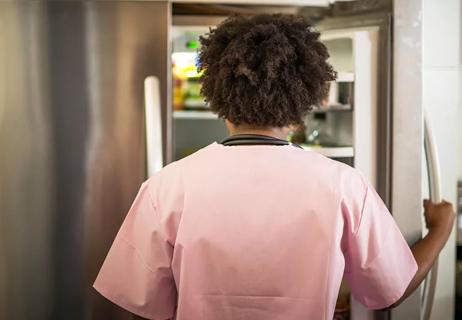
And how to recognize the signs of addictive eating
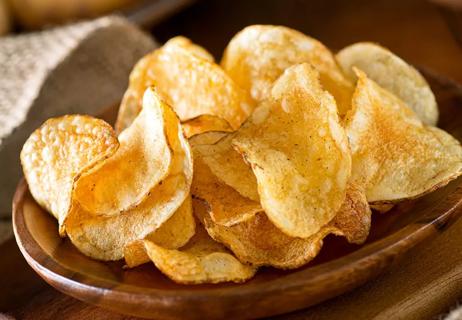
From rice cakes to veggie straws, their answers may surprise you
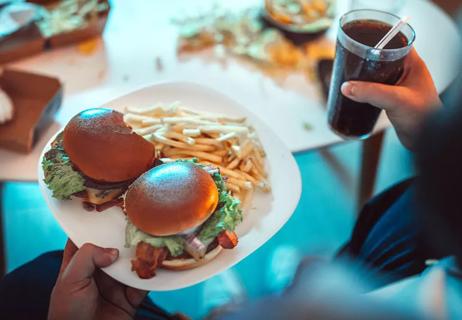
Practical tips for curbing cravings and smart swaps

Even small moments of time outdoors can help reduce stress, boost mood and restore a sense of calm

A correct prescription helps your eyes see clearly — but as natural changes occur, you may need stronger or different eyeglasses

Both are medical emergencies, but they are very distinct events with different causes